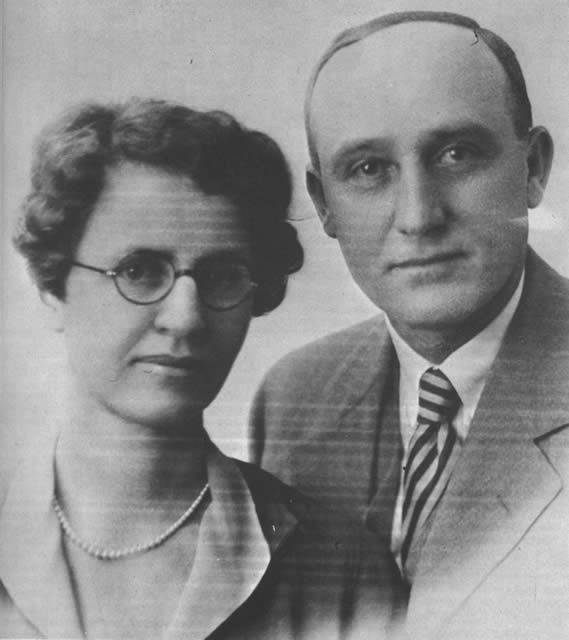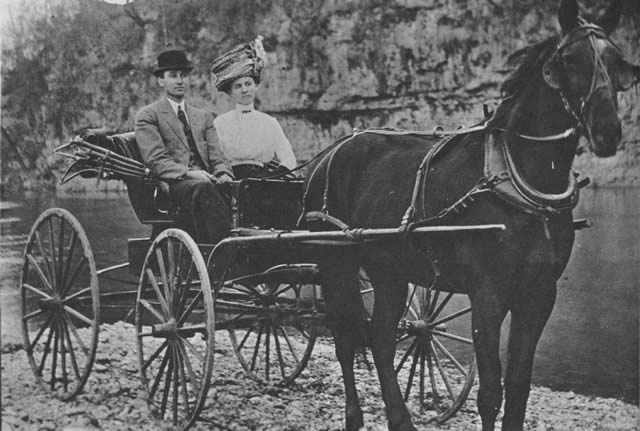Volume 2, Number 8 - Summer 1966
John W. Bennett
By Elmo Ingethron

When I first met him I was a timid 4th grade boy and he was Mr. John W. Bennett, county superintendent of schools. He was tall, well-dressed and had the posture of a military man.
He drove a fine horse, named Kelly, to a respectable buggy. It was autumn time and a fine day for travel. Mr. Bennet was making his official visit to the Old Flint Hill school.
[5]

In due time Mr. Bennett was introduced by the teacher and spoke to the pupils present. He soon bridged the chasms between us and we talked together on a common plane. After more than 45 years I still remember some of the things he said. The time that day seemed to have flitted away and all too soon my new-made friend was ready to leave. As he departed, the boys stood gazing at him, admiring the man, his buggy and steed.
After his visit that day my "Robin Hood day dreams" faded away, and I began to have visions of driving, "post haste", a fine steed, like Kelly, to a new buggy about the neighborhood. Of course, as I reasoned then, a poor and ordinary boy like myself could never hope to actually become a county superintendent of schools, but I could see no harm in playing for a time in a "make believe" world.
A few years later I was to know my friend as Mr. John W. Bennett, Forsyth’s Elementary School Principal and Scout Master. I had held my admiration for him intact and was to benefit greatly by the lessons, hikes, and talks around the camp fires of the Boy Scouts. There was outdoor cooking, degrees in scout work and citizenship training. We raised our country’s flag and pledged our loyality to it. We took the scout oath and sang patriotic songs that became a part of me and a pillar of strength through my war years.
Mr. Bennett possessed a well-diciplined sense of humor that was always enjoyed by the boys. His job demanded the skills of a leader and he was well out front in leadership.
For nearly half a century, John W. Bennett served humanity well. Perhaps it is well that we take a closer look at the one who has done so much for the youth of his time.
John W. Bennett was born at Protem, Missouri, January 9, 1881. He was the third of five children born of John W. Bennett, Sr. and Sarah (Teague) Bennett. They were: James, William, John, Alice and Chester (Chub). Four of the above children answered the call of the teaching profession and devoted a part of their adult lives to teaching. But John W. was the only one to make it a career and a lifetime profession.
Mr. Bennett began teaching at an early age where he taught in the school districts of Swan, Helphrey, Dickens, Taneyville, and Branson. In 1908 he was married to Katherine Leibhart who was a loyal wife and was also devoted to the teaching profession.
[6]
At the annual school election in the spring of 1911 Mr. Bennett was successful in his bid for the office of County Superintendent of School where he served for a period of twelve years. His tenure in the county office of education embraced a period of great changes and many improvements in the county’s educational system.
For more than half a century the old "reader system" with its accompanied short terms of school had dominated the educational thinking of the people. Even though former county school commissioners had recommended higher teacher qualifications, longer school terms, and a graded system of education, it remained the task of Superintendent Bennett to organize and fully establish such a system.
During Mr. Bennet’s tenure in the county office of education the curriculum was expanded to include additional subjects. Buildings and instructional equipment were added and improved. In-service training for teachers was emphasized with the presence and participation of college presidents and the State Superintendents of Schools in the county-wide teacher’s plan meetings.
Superintendent Bennett encouraged what is now referred to as extra-curricular activities in the school system. He sponsored various types of farm projects for the more than 90% of the pupils living on farms. There were community fairs where corn-growing champions and the like were honored. There were county wide spelling contest etc., where recognition could be given for academic excellence. He sponsored athletic clubs and ball teams were a large measure of teaching took place. Some of his players received state recognition. Young "hot heads" were cooled a bit by his boxing matches, and sportsmanship was duly honored.
A careful study of the newspaper files of the time seems to indicate that John Bennett was a dynamo of educational inspiration. His administration of the county schools came at a time of growing public interest in education and Mr. Bennett did much to create an educational consciousness among the people. He often attended professional meetings and wrote news releases for the local newspapers on the educational needs of the children.
Mr. Bennett’s leadership was not limited to the field of education. He and Mrs. Bennett took an active part in civic and church activities of the community. Johnny, as he was often called, was noted for his leadership in the Boy Scouts, ball clubs, community fairs, war bond sales, and Sunday School and church activities.
After completing his administrative and supervisory duties in the county office of education, Mr. Bennett accepted the position of Elementary Principal of the Forsyth School. Mrs. Bennett taught in the grades with him. She was a loyal co-worker and assistant.
Each year when the school term came to and end and the last farewells and good-byes were exchanged, the Bennetts were off to the school campus of the Colorado State College at Greeley. Their arrival on the Greeley campus was something to look forward to by both the Bennetts and their fellow teachers and friends who took summer courses there. John and Katherine Bennett were still young, with a thirst for knowledge and a deeply instilled urge to teach. At Greeley they could drink from the flowing fountains of knowledge and further prepare themselves for their chosen careers. They enjoyed their summers in colorful Colorado. Life was indeed exciting and together they drank lavishly of its blessings.
But when summer’s end drew nigh the Bennetts returned to their respective charges, effervescing with new knowledge, new adventure and new methods, ever eager to impart their knowledge and wisdom to inquiring minds. For some years the annual migration of the Bennetts to Colorado for the summer and back to Forsyth for the remainder of the year continued. It was a happy life for the school master and his mate. But in due time there came a call to new and greener pastures. The Bennetts answered the call.
In the spring of 1928 the Bennetts departed for the Oregon country as many another of their countrymen had done before them. They were offered good positions with good pay in the La Grande, Oregon, school system. Life in Oregon was rewarding for the Bennetts for there they served the cause of education for 27 years.
For three decades I had little or no contact with the Bennetts. But after their retirement and the death of Katherine Bennett, Johnny returned to the haunts of his childhood and lived the remainder of his life in Taney County. During this time I was privileged to share some Canadian camping trips with him.
In our wilderness camps in the Canadian northwoods I found John Bennett the same old inspiring leader he was when I was a Boy Scout. He still possessed a sense of cleanliness about our wilderness camp as if the scouts were there observing their master. No mater how remote the campsite, every speck of litter was properly disposed of and the camp fire out before Johnny Bennet departed. He still practiced a diciplined sense of humor adding laughter and joy to the occasion. His language was as refined in the wilderness as if in the presence of the church choir. He obeyed the fishing regulations as if it was a special privilege to do so. Johnny was a good camp tender, living the "golden rule" and
[7]
making life a little better for his fellow man. John W. Bennett was true to himself, and served his God and his country with a full measure of devotion.
Certainly the blessings of having lived a good life were his. He enjoyed the sunrise and the sunset; the picturquese waterfowls fading into the evening gray; the evergreen landscapes upon the horizon; the majestic displays of the Northern Lights and a thousand manifestations of God’s handiwork. Each changing scene brought back memories of the past, but they were always pleasant memories, for John Bennett had lived a good life.
In due time the evening shadows of life lengthened across his pallid face and dimmed his memory to the realities of everyday life. He answered the Master’s call on March 22, 1966 and crossed the great divide.
[8]
This volume: Next Article | Table of Contents | Other Issues
Other Volumes | Keyword Search | White River Valley Quarterly Home | Local History Home
Copyright © White River Valley Historical Quarterly

